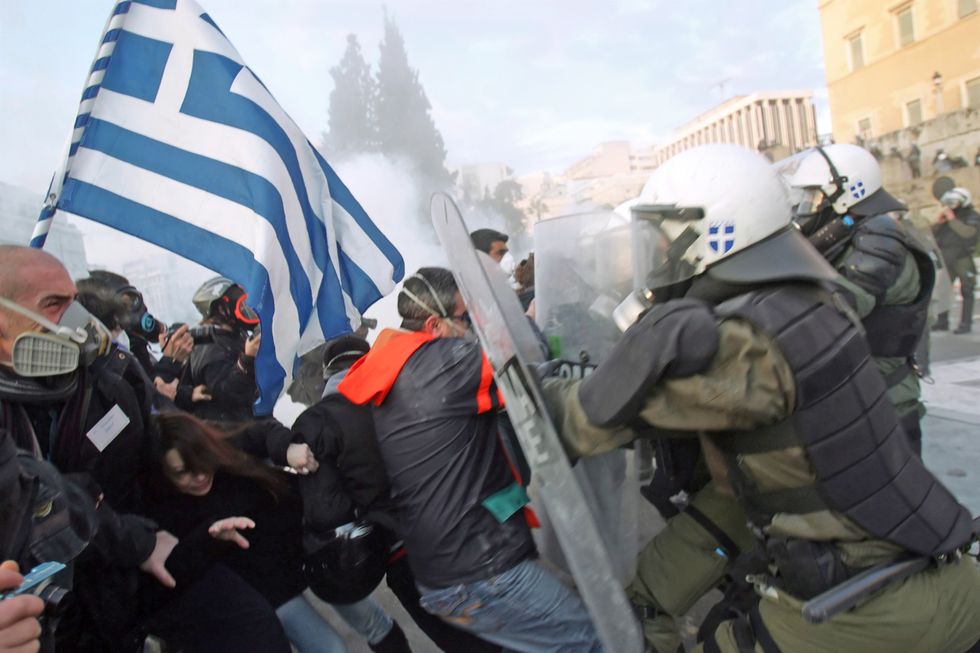Athens never should have got in, but now the EU had better learn its lesson
Greece is in turmoil from rioting, and its institutions are close to collapse. But not even devaluating the drachma by 50% will solve its problems, because the country’s only industry is tourism
by Alberto Quadrio Curzio*
Greece is experiencing not one but two crises - a financial one and a social one - and is on the brink of two more - involving its institutions and its currency. The solutions to the crises, which are all connected and interrelated, do not have the same time frame so that ending one does not mean overcoming them all.
The financial crisis. It concerns whether or not the IMF and the countries of the Eurozone will or will not give Greece financial support in the form of 130 billion euros. They have already granted a first bailout of 110 billion euros between 2010 and now. The new bailout is subject to approval of new austerity measures and the binding promise that they will be implemented regardless of who wins the elections in April.
The measures will necessitate dismissal of public employees, reduction of pensions and salaries and other cuts to public spending, as well as privatization and liberalization. The Greek parliament approved the measures in a dramatic all-night session between 12 and 13 February. That was supposed to open the way to the concession, as well as an interim loan of 35 billion from the EFSF fund which will enable the government to repay 14.5 billion in bonds due on 20 March and reach an agreement with private creditors, mainly large banks.
They would waive credits for about 100 billion through an operation of extension to 30 years of government securities at controlled interest rates. This would bring the public debt down to about 250 billion euros, making it possible, according to the estimates, to reduce it to 120% of the GDP by 2020, thereby also legitimizing the IMF to continue its support to Athens.
The social crisis. It is very serious and could have institutional consequences. Unemployment is up to 20% and among young people it is close to 50%, growth has been negative since 2008, down to almost -6% in 2011 with a forecast of -3% for 2012. Five ministers have resigned in protest against the salary and pension cuts demanded by the Troika, and pitched battles between demonstrators and police are a daily occurrence.
Under these conditions, added to the problem of a government structure near collapse, it is unlikely that there will be foreign investments in Greece and that the privatizations will be very successful. The social crisis is dragging a section of the population into poverty, to the point where it will soon be necessary to provide humanitarian aid. The Olympic games held in Athens in 2004, which also contributed to public and private misappropriation, really seem to belong to another century.
The currency crisis. This would be the outcome if Greece were forced to go back to the drachma, devaluated by at least 50% with respect to when Greece joined the euro. Actually, Greece should never have been allowed to join the unified currency because its admission was based only on public finance parameters (which were later discovered to be falsified) and not also on the real institutional, social and economic structure of the country.
It is an error the Eurozone must not repeat. If Greece renounces the euro it would renege on its foreign debts but also on a large part of its public debt, converting it into drachmas and opening a dispute that could last decades and would only benefit the international law firms involved. It could not, however, pay in drachme for the imported goods on which the country depends heavily, and it would be necessary to purchase euros and dollars with the only export product it has: tourism.
Not an easy thing to do. It is also hard to say what effects all this would have on the extremely fragile Portuguese economy. In conclusion, we had better hope, for now, that an agreement can be reached by the representatives of the Troika, the Greek government and the private creditors.
But immediately afterward, the European institutions should aid in the reconstruction, starting from the real economy with a definite program developed and implemented by consortiums of EU enterprises using EIB loans to make infrastructural investments. It would be equally important to enact a social and institutional reconstruction in the country, but this, unfortunately, does not seem to interest the EU institutions.
*professor of Institutional Economics at the Department of Political Science of the Università Cattolica and vice president of the Accademia dei Lincei

